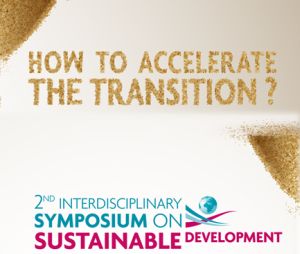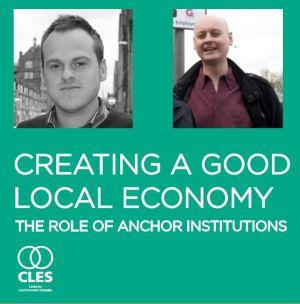Archive for “Originally posted on Transition Network” category
Showing results 91 - 95 of 383 for the category: Originally posted on Transition Network.
8 Sep 2015
Juliet Davenport is the founder and CEO of Good Energy, who are the main sponsors of the 2015 Transition Network International Conference. As part of our current theme on ‘Fairness’, we spoke to Juliet and started by asking her what, for her, does a fair energy system look like? Here’s the audio, followed by a transcript:
“I suppose a vision of the future where we see a much fairer system is where individuals are in better control of their energy and I think that on many levels: one, that individuals can be part of generating energy themselves. They can either do that in their own homes or as part of community action. Businesses can do the same, businesses can generate their own power.
The power isn’t concentrated in one place, unlike the energy market we’ve seen for the last 30-40 years where an essentially centralised system has been slightly dictated to by the way the market has been structured, and all those large decisions about who makes margins on the central system all comes through as a big regulative central body, and actually the individuals who buy power on the ends don’t have any influence on that whatsoever. My picture of a fairer world is actually individuals can become part of it, rather than excluded from the energy market.
What’s the role of communities and community energy? You’re one of the biggest companies that supports community energy. Why does it matter?
Communities have various different roles. Different communities have different strengths so you can’t put them all in a box. We see the strength of communities in that people tend to trust their neighbours rather than trusting energy companies about energy. There was some brilliant work done by a couple of big community groups and volunteer group on energy efficiency. People went door to door talking to their neighbours about things they’ve done in their own homes, and that had huge cut through in the uptake of energy efficiency and the thoughtfulness about energy efficiency. The same on renewables: when we work as individuals we tend to like to hear other people’s stories about what they’ve done in terms of energy.
So if I hear that my neighbour’s done his solar panels, which is exactly what I heard and I hadn’t got round to doing it for ages, I then got on and did mine. In communities we give each other confidence to do things on an individual basis but also we can come together at a community level and do bigger, more engaged pieces around our schools, around even bigger potential renewable projects. Community has this huge long term influence on our usage and development of renewables and energy more widely, and we quite often underestimate the huge influence it can have.

We mentioned before there the recent announcements that the government are considering up to 87% cuts in subsidies for solar. What’s that all about?
It’s a really interesting position. Actually, what we’ve seen is the success of renewables particularly over the last 2-3 years. Renewables have delivered 21% of our electricity requirements in the first quarter of this year and what we’re beginning to see now is that’s beginning to have a wider impact on the energy market as a whole. What that means is that you have different voices in there basically saying “you’re reducing our margins, this is happening”, so we’re beginning to see a kickback, I think. That’s twofold, one is that the Treasury is basically saying that we can’t add any more to people’s bills to support renewables.
Our argument against that is actually renewables are reducing the cost of energy bills as well, so you need to take the two into balance, and actually longer term, low carbon could mean low cost as well. You have to take a longer term view. What we’re seeing is a very short term view of the fact that they put a budget in place between the Department of Energy and Climate Change and the Treasury, that budget looks like it’s going to be overspent, but actually the budget was false in the first place and our concern is we’ve not got enough voices in there actually telling people about the benefits of renewables that we will really see coming through, reducing everyone’s bills in the UK.
We are now seeing some very ambitious community energy projects like Bath & West Community Energy who’ve raised millions of pounds in community investment. Thousands of community energy projects, some of whom are attracting some very serious investment and then using that not just to do energy but also to do all kinds of interesting things. Many of those would be Transition groups. If this goes through, what impact will it have on those projects, do you think?
I think we’ll see a lot of those projects go away and the creativity we’ve seen around renewables being able to be an engine for communities will disappear, and that will be a real shame. This is one of the points that we need to work with government on, is to potentially protect the community element whether there is a way forward where communities can still, particularly if they’re shown to be giving proper community, local community benefits, then actually they should be supported and maybe supported from budgets other than the Levy Control Framework.
One of the things that’s been interesting with the Labour Party leadership election has been, going back to the question of fairness, this idea that if you have a load of policies that are around fairness and equality, then you become unelectable, one of the things that has been levelled at Jeremy Corbyn. I wonder if you have a sense of whether stuff that really makes a fairer society or a more equitable society in terms of energy and other things is really electable, something that people really want.
That’s a really interesting question and my honest answer is I don’t know because I have never tried to elect off the back of it. There is a passionate feeling about energy amongst a lot of consumers. Not all consumers obviously, because we already know that up to 50-60% of the market has never switched. But everybody else is very concerned about whether they’re being ripped off, are they getting a fair deal from their energy supplier, what are the options for them going forwards.
There’s a reasonable percentage of customers who think getting a fair deal is important. We saw in the election that although Labour didn’t bring it forward, that policy that they talked about in terms of trying to bring fairness into the energy market was a very popular piece for them to discuss in the initial days. What we saw was that it was then overtaken by other areas. Actually that whole piece around fairness on energy bills was very powerful and it got a lot of press coverage. So I would question that. I think presented in the right way, it is a really important point.
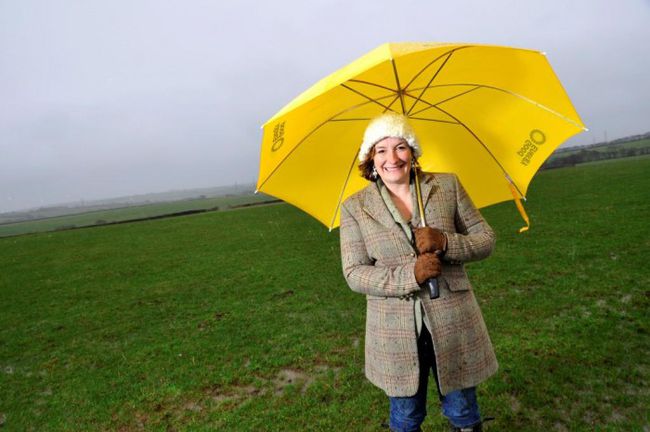
What does the recent competition market review tell us about the fairness or unfairness of having the ‘big 6’ model that we currently have in the UK?
What’s really interesting about that is that the CMA (Competition Market Authority) did a review and they looked across the whole market to see whether it was working properly or not. One of the key findings was that those customers who have never switched, those people who have stayed with their energy supplier ever since they were made back in the late 90s, essentially are being treated unfairly. So they aren’t being given the best deals, and although those customers probably expect that those companies are looking after them, they’re really not looking after them. That’s a real shame actually and continues to undermine trust in the energy market.
I suppose from our point of view, the more individuals who can get involved and take control of the energy market, i.e. become a producer or start to change their behaviour or work with communities to work with overall community behaviour, the better. I had a lovely story the other day where we talked to this lovely lady about what she does with her energy bills. Actually she invites her next door neighbour over for a cup of tea and they compare energy bills. That’s not something that I would have guessed that anybody would want to do, but that’s the kind of thing we want to see happening, people being empowered on an individual and community level to discuss energy, to take it into their own hands and do something about it.
Read more»
28 Aug 2015
While my garden has often played host to dear friends or visitors, I can think of very few visitors who were so unexpected, and who brought my family to a respectful and awe-filled silence, as a recent visit by a Hummingbird hawk-moth. No I hadn’t heard of them either.
In ‘Feral’, George Monbiot writes beautifully of those moments when nature unexpectedly takes your breath away, brings wonder into your life. I was sitting in my garden with my wife and son, and suddenly noticed what looked like a tiny hummingbird. It was flying from flower to flower, dipping in its probiscus, busy, busy, but oh so beautiful. We were all puzzled. “What on earth is that?” “Quick, take a photo!” “Where’s my phone?” That moment of tension between wanting to photograph something but not wanting to leave it in order to look for a camera in case in that time it disappears and you never see it again. It moved too fast for photographs, all I ended up with were lots of blurry images of our flowers. I did film it though, here it is:
It didn’t stay long, but the impression it created has. None of us knew what it was, but when I tweeted the video asking if anyone could tell me what it was, I soon found out. It is usually only found in warmer climes than Devon, and its Latin name is Macroglossum stellatarum. It’s a strong flyer though, and often travels northwards, although rarely survives the winter. I loved the fact, according to Wikipedia, that “it overwinters as an adult in a crevice among rocks, trees, and buildings. On very warm days it may emerge to feed in mid-winter”. I know a few teenagers like that.
That such a graceful, beautiful and exotic creature exists at all was a source of great wonder. That it chose to pop into my garden while I was having lunch was a very special moment. And this is from someone who still talks in excited tones about the last time hedgehogs paid a visit. Anything ever turned up in your garden that you might tell your grandchildren about?
Read more»
27 Aug 2015
Academic work on Transition can often be infuriating rather than illuminating. I was once asked to peer review a paper on Transition, a movement I was central in kickstarting and shaping, but I had to decline on the grounds that the paper was utterly incomprehensible. While some research is excellent, and offers useful insights and meaningful data, there is also much that leaves me cold, or bewildered. With this in mind, I picked up a copy of Luigi Russi’s ‘Everything Gardens and other stories: growing Transition Culture‘ with a certain trepidation.
Russi is a sociologist based at the University of Exeter, who set out to research Transition Town Totnes, not through a literature review or a few interviews, but by moving to the town, rolling his sleeves up, and getting involved. In spite of my initial reticence, I actually loved ‘Everything Gardens’, and had a few ‘aha” moments as I went through. Russi begins by questioning the usual approach that academic work on Transition tends to take, that of defining what it is (i.e. a response to peak oil and climate change etc), then to the model it proposes (still usually stuck on the 2008 model of ‘The 12 Steps’), which leads to an assessment of how well Transition is achieving its goals, how it is ‘performing’? It’s an approach that treats Transition as though it were some sort of set of policies that can be evaluated. As a result of this approach, much of the ensuing research bears little resemblance to what many Transitioners will be experiencing through their active participation in Transition.
 For Russi (right), academic research on Transition needs to be more immersive, needs to experience the “living moments through which it comes into being. And by moving with it, letting ourselves be moved as well”. For some academics, the move from the 12 Steps in The Transition Handbook (2008) to the Ingredients presented in The Transition Companion (2011) to the Support Offer (2015) is bewildering and speaks of inconsistency and uncertainty (it is an endless source of frustration to me how many academics still turn too 2008’s Handbook as the source for what Transition is). For Russi, this adaptability is just what you would expect from what he calls “a dynamic process through which Transition unfolds as a form of life”, and each formulation of it should be seen as “just passages through which this phenomenon has appeared”. Russi sees his task in immersing himself in Transition in Totnes as being “to go as deep as I can into the fine details of the phenomena of Transition”.
For Russi (right), academic research on Transition needs to be more immersive, needs to experience the “living moments through which it comes into being. And by moving with it, letting ourselves be moved as well”. For some academics, the move from the 12 Steps in The Transition Handbook (2008) to the Ingredients presented in The Transition Companion (2011) to the Support Offer (2015) is bewildering and speaks of inconsistency and uncertainty (it is an endless source of frustration to me how many academics still turn too 2008’s Handbook as the source for what Transition is). For Russi, this adaptability is just what you would expect from what he calls “a dynamic process through which Transition unfolds as a form of life”, and each formulation of it should be seen as “just passages through which this phenomenon has appeared”. Russi sees his task in immersing himself in Transition in Totnes as being “to go as deep as I can into the fine details of the phenomena of Transition”.
He argues that Transition ought not be talked about as a movement, but as a moving. It’s adaptation, its ‘multi-dimensionality’, its increasing diversification, playfulness, creativity and openness to new ideas, influences and practices, are the heart of what Transition is about, rather than the models published at different times which represent little more than snapshots representing one person’s interpretation of how it looked at that particular moment. As he puts it:
“The perception that prompts my inquiry into Transition is not so much that it can be a set of strategies to address peak oil and climate change. Instead, it is that Transition – what Transition is – moves. And this movement is what this book tries to provide an account of”.
It’s an interpretation which reminds me of one of my favourite quotes from Christopher Alexander’s seminal book ‘A Timeless Way of Building’:
“For the fact is, that this seeming chaos which is in us is a rich, rolling, swelling, dying, lilting, singing, laughing, shouting, crying, sleeping order. If we only let this order guide our acts of building, the buildings that we make, the towns we help to make, will be the forests and the meadows of the human heart”.
He then goes on to talk about his observations from participating in various strands of Transition in Totnes: food growing, Inner Transition, Transition Money and REconomy. One of his observations is that the best Transition projects are those that remove as many barriers to engagement as possible, or as he puts it when talking about the role of community gardens, they have “the capacity to involve people without asking too many questions”. “It’s a very low threshold organisation”, he writes. As he puts it:
“As a strategy for change, this involves the creation of spaces to meet people where they are, and ‘activate’ them to the possibility of developing new attachments that may shift the very position from which they develop their opinions, eliciting greater openness to the rest that Transition culture holds”.
Food growing then, for example, acts as an invitation, that in the context of Transition it can serve as a ‘facilitation tool’ to draw people into Transition from which point other ideas and experience open up for them. As he puts it, “food within Transition appears always as an open invitation to get involved in something else and something more”.
Likewise, the Totnes Pound, he suggests, provides “a different opening through which people can be approaches at the lowest point of contact: namely as consumers and users of money”. Like food, accepting the invitation to use a local currency brings with it the possibility that people “become progressively more entangled across the spectrum of Transition activities”. Just the act of calling it a Pound rather than an Acorn (the name of the LETS scheme which preceded it) is an attempt to remove barriers and unfamiliarity.
REconomy, he suggests, offers a powerful way of thinking and talking about another strand moving within Transition. Rather than it being rigidly defined what REconomy is, with a tickbox exercise that determines whether you are or aren’t, it is the ability to talk about ‘REconomy-type things’ that is where its strength is. That it enables an emergent strand in the ‘moving” or Transition to be identified. It opens up the possibility of taking a more enterprising approach, enabling different aspects of Transition to start to think about themselves more entrepreneurially.
Russi’s immersion with Inner Transition is also fascinating. He again avoids the academic impulse to try to define what Inner Transition is, stating, “I have found that questions of definition mattered little to my ability to engage effectively with it”. For him, it speaks either to the quality displayed by a person (an ‘Inner Transition-type’ of person) or by an activity (an ‘Inner Transition-type’ of activity). He argues that Inner Transition has moved from initially being a group within a Transition initiative that works with a particular set of practices, to being a thread that runs through all of the activities of a Transition group, “sometimes implicit in the life of Transition, rather than explicit”.
nner Transition, he writes, offers “facilitated spaces where conersation and conscious examination of the ‘process’ of working together, of the life of the group as a grouop, becomes possible”. In this sense, Inner Transition also plays a key role as it makes it more likely that people will feel more able to remain in and work within groups, another strand of how Transition nurtures involvement. Inner Transition, he argues, is no longer the domain of ‘Heart and Soul’ groups, but is another key identifiable strand running through the wider ‘moving’ of Transition.
He then goes on to look at what he calls ‘exemplars’, the wide diversity of practical projects emerging in Totnes. He draws attention to the stories many of them tell (‘The Nut Tree Capital of Britain’ for example), and their openness to adaptation, and to evolve and move, their “being open to further specification”. Another quality he notes in such projects is what he calls their ‘excessive quality, “in the sense that they constantly point beyond themselves, to what next questions and possibilities for action open up at every step in the process”.
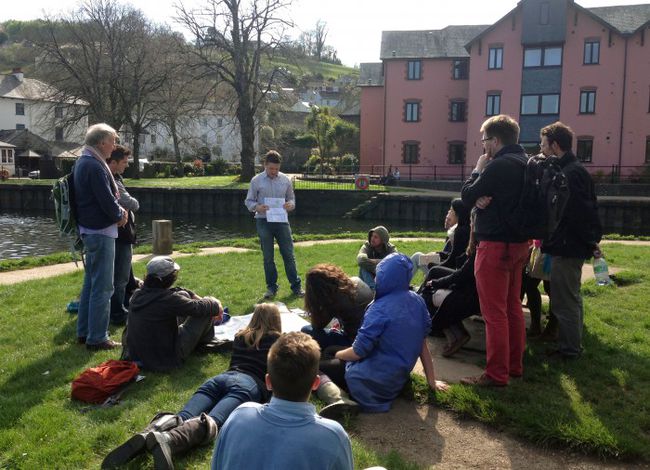
He looks at what he calls the ‘insider/outsider’ dynamic, in particular the ripples generated by the successful No To Costa campaign, and how this, in the sense of Transition as a ‘moving’, helped to shape future activities to be more inclusive, more invitational, more consciously designed to reach deeper into the community. He also looks as how Transition unfolds, writing:
“[Transition] conjures a culture that offers the means to tease out that initial disquiet, developing the resources needed to get to know it better and more intimately, and to ascertain its implication for how we ought to proceed next into as many domains in which connected orientational dilemmas may present themselves to us”.
It is in the “let it go where it wants to go” spirit that Russi finds Transition most fascinating. “Transition”, he writes, “is constantly perched between innovation and drift”, and it is this that leads to Transition being what he calls a ‘living tradition’. He adds, “Transition enfolds both all that has taken place within it, as well as ‘inviting in’ determinate future possibilities”. This takes us back to his sense of Transition as not being a movement (“something completed and now frozen in the past”) but rather a ‘moving’. When we make this shift, he writes:
“we can relinquish the temptation to ask what Transition is ‘meant’ to achieve, and instead become engrossed in the process of figuring out how it ‘goes on’. From a linear, causal focus, Transition-as-moving enables instead an orientational focus; how does Transition find its way in response to the disquiets and concerns it stumbles across upon its moving. And how can we find our way within Transition, to be able to perceive it as a social phenomenon in the process of appearing before our eyes?”
What to some may appear to be tensions and contradictions within Transition for Russi speaks of “a social phenomenon that is alive and restless, as it lurches forward and subsequently reshuffles itself in response to whatever new practice has been drawn in its unfolding”.
I have only two criticisms of ‘Everything Gardens’. The first is that there are a number of moments when Russi lapses into an academic way of explaining himself that overcomplicates and infuriates, for example when he writes:
“As aids to cultural imagination, practical exemplars form knots along mobile trajectories of concerted activity … entangled in this way, they provide tautness to a matrix of material and discursive resources primed for further uptake, iin order to help cobble together what other forms Transition will be able to take in response to intervening social exigencies. Or, to restate it backwards, shared disquiets, as arresting moments of dis-orientation, elicit practical responses”.
I was left with a sense that a Plain English rewrite of this book, with more the inclusion of some photos and other elements to make it more accessible, could prove a popular addition to the more accessible literature on Transition. My scond reflection is that, as an academic analysis of Transition’s unfolding in Totnes, it is very uncritical of what it sees. Clearly from my perspective, Transition Town Totnes is a wonderful thing doing wonderful work, but having spent a lot of time here, I was surprised that beyond a couple of small points, the book wasn’t more analytical of what he saw as its failing, faults or weaknesses.
But in summary, I really enjoyed ‘Everything Gardens’. It offers a refreshingly different academic take on Transition, one that, to me, feels like it best describes Transition as I see it, as I experience it. I very much recommend it as deeply insightful addition to the literature on Transition.
You can find out more about the book here, and here is a video of Luigi himself describing the book:
Read more»
26 Jun 2015
On May 20th in Brussels, the Second Interdisciplinary Symposium on Sustainable Development took place. The opening session brought together Rob Hopkins of Transition Network and Gunter Pauli of the Blue Economy, who calls himself a “serial entrepreneur”.
According to Wikipedia, “Le Point, The Huffington Post and The Tasmanian Times have called him “The Steve Jobs of Sustainability””. In the video below you can see both presentations, and also the discussion that took place afterwards.
Read more»
16 Jun 2015
We are often asked “what would a Transition local government look like?” It’s a complex question, but one Council taking a pioneering approach to its local economy is Preston in Lancashire. Preston City Council, working with Centre for Local Economic Strategies (CLES) recently published ‘Creating a Good Local Economy: the role of anchor institutions‘, a remarkable document. To find out more, I spoke to Matthew Jackson, deputy chief executive at CLES and Cllr Matthew Brown, Executive Member for Social Justice, Inclusion and Policy at Preston CC. “The game’s up for the old system”, he told me, “if you want to do something really transformative and really radical, it means doing something really new and really creative”. So they did. It’s a deeply fascinating, and inspirational story.
 Cllr. Matthew Brown (MB): Traditionally it seems to me we just tried to act as a magnet for outside institutional investments to come in, but with this economic crisis we’re seeing that that’s not working any more. A lot of the investment we had in the last 10-15 years is just not happening. So it’s more of a systemic issue in the economy that needs to be tackled. One way of doing that is to make sure that the wealth of the locality is maintained by the people that live here.
Cllr. Matthew Brown (MB): Traditionally it seems to me we just tried to act as a magnet for outside institutional investments to come in, but with this economic crisis we’re seeing that that’s not working any more. A lot of the investment we had in the last 10-15 years is just not happening. So it’s more of a systemic issue in the economy that needs to be tackled. One way of doing that is to make sure that the wealth of the locality is maintained by the people that live here.
Matthew Jackson (MJ): Local government doesn’t necessarily understand its local market and the types of organisations that are available to deliver the goods and services it requires. So there’s a need for a more intelligent relationship between the public, the commercial and the social sector put in place to enable organisations to be delivering more services.
MB: If you look at what’s happening across America, you see that capitalism is not producing the outcomes that it needs to, so people are looking at locally-directed alternatives to it. It’s not just procuring, it’s also pension fund investments, American citizens’ university endowments which go in the local economies’ criteria, it’s credit unions, it’s Community Land Trusts, it’s local currencies, municipal enterprise, co-operative generation of energy: there’s all kinds of creative responses to what is a systemic problem and the fact that the current economic model is not producing the outcomes it needs for the majority.
Historically, when you have one system, over a period of time and decades of it falling out of favour with a majority of people, that is the precursor to the beginnings of a new system over the next few decades. We could be seeing that happening over here in the United Kingdom as well.
MJ: We’ve worked with a number of local authorities to measure the impact of their procurement spending in their local economy in terms of job creation, supply chains, development of apprenticeships, issues around addressing challenges associated with the local environment. Through all of that, we’ve done a range of looking at the multiplier type analysis, working strategically with local authorities to change their procurement so it brings a wider range of benefits for their places.
MB: We still have the issue of people working longer, the issue of inequality: we are heading towards a Medieval distribution of wealth. The top 1% probably have as much wealth as the bottom 40% and that’s similar to what happened in Medieval Europe. We’re seeing all these trends heading in a certain direction and once you continue to exaggerate, that’s when people think “I’ve had enough of this, I’m going to start looking at something new to progress us upwards”. We could be seeing that now.
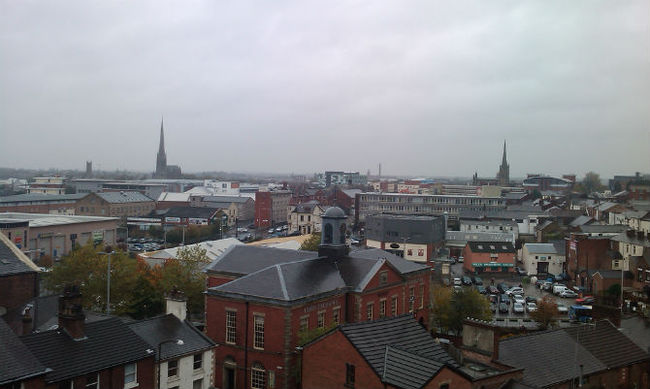
MJ: About 2 years ago we realised that there was a whole host of other institutions within a place that had procurement spend and which could also derive a wider set of benefits to the local economy. We chose Preston as a bit of a guinea pig really and began to look at the supply chains of other institutions in Preston. We’ve been working with the University, with further education colleges, with housing associations, the police, and also two major local authorities.
It was important from the outset to engage with key stakeholders with each of those institutions, so we effectively went to sell the project to the leaders and chief executives of the local authorities: so Preston City Council obviously, and Lancashire County Council. But also there were discussions with the chief executives of the other institutions. From that, there was buy-in to the project and what we’re trying to achieve. But what we also wanted those organisations to do was effectively open their books and give us access to their procurement data.
MB: It goes back to a discussion we had within the ruling Labour group while we produced our manifesto. Myself, in particular, I wanted to try to look at certain alternatives that had emerged such as in Spain and Italy at the time. That was most notably Mondragon in the Basque region of Spain, also Emilio Romana in Italy. Within those two areas they managed to transform the private sector economy where they actually managed to provide an alternative to the capitalism they saw around Europe within the local economy. That’s what was the inspiration. That was what we started investigating doing when our administration took control a few years back.
MJ: For each of the six institutions we requested their procurement spend for the financial year 2012-2013 and specifically their top three suppliers by value. What we wanted to do with that information was understand the extent to which those organisations spend within the Preston economy and the extent to which they spend within the wider Lancashire economy because it’s effectively a 2-tier area.
What we found collectively across all those anchor institutions was that they spent over £750 million a year buying goods and services and from that only 5% of that was spent with businesses based in Preston and only 39% was spent with organisations based in wider Lancashire.
MB: Cleveland in America had quite a lot of industry, and over the last few decades it’s disappeared totally. They got the place-based institutions to increase spend onto the local economy through the goods and services they procured. As well, increasing that upwards, creating jobs for local businesses. They also used that spend to create a network of worker-owned businesses known as Evergreen Co-operatives.
MJ: We’ve held workshops where we’ve developed a collaborative procurement charter across each of the anchor institutions, about encouraging them to use local suppliers and think about local issues as part of their procurement process. We’ve also done a series of gap analyses to try and understand the areas of contract for various services that potentially be delivered in the future by more local institutions. To give you an example, in terms of the Preston City Council spend, they identified it was potentially around £3 million which we’ve termed as ‘influencible spend’. That’s spend that’s not necessarily tied up in frameworks or not available in the local economy.
It’s things like catering or building maintenance or building cleaning. There’s scope for that money to potentially in the future to be delivered by more local organisations. We’ve identified that £3 million. We’ve identified businesses that can potentially deliver that activity in the future. It’s a case now of Preston City Council, when it comes to their procurement process, actually starting an early engagement process with those businesses to see if they have the capacity to potentially deliver those services.
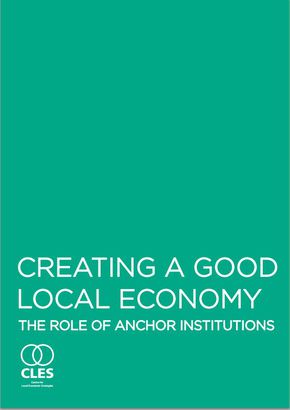 MB: Obviously there’s a huge opportunity to increase our local spend upwards. The amount of wealth that’s leaching out is quite significant.
MB: Obviously there’s a huge opportunity to increase our local spend upwards. The amount of wealth that’s leaching out is quite significant.
MJ: Our work in other places such as Manchester shows how local authorities can think strategically about their procurement. It also enables them to develop relationships with commissioners and other people within their local authorities to ensure the maximum benefit is achieved through the resources that remains under the control of that local authority.
MB: So you’ve seen a situation where the spend in Preston has gone up by about 3% to the Preston economy and to the Lancashire economy it’s now around 35%. We’re shifting spend to the local economy. You get a sort of multiplying effect in which wealth is retained and jobs are created.
MJ: A lot of local authorities currently have in their corporate strategy or their community strategy priorities around reducing worklessness, around raising aspiration in their population, around fostering private and social sector growth within their economy. Maximising the benefits and understanding more effectively that procurement spend is a way of achieving some of those wider outcomes.
It’s a way to sustainability and development of local business. That’s always been our key selling point, that the analysis that we undertake is effectively an evidence base as to how authorities can think through how they purchase, and also achieve wider corporate and indeed social outcomes through their procurement spend.
MB: We’ve had a number of successes, most notably with the County Council, where we managed to get a contract worth about £2 million on a fresh fruit project which has gone to a Preston company. In addition to that, Lancashire Constabulary, a printer contract has managed to go to a Lancashire company as well. The success is there, but in the long run there are a number of other things that we want to look at to create community wealth. We’re looking at things like local currencies as in Bristol. We’re backing the Move Your Money campaign so our own investments which are quite considerable, over £20 million, we’re looking at shifting that to the local economy to invest in more sustainable businesses and economic activity within the Preston boundary.
We’re also looking at the pension fund that we’re part of. That’s got £5 billion of our money invested and the majority of that is invested in equities that are abroad. If we could shift 10% of that to the Lancashire economy it would be a significant tool to localise the wealth and make sure the wealth stays local. We’ve also got back a Credit Union which is due to be launched next month, when our original one went under in 2007.
We’re also doing things with the Living Wage. We’ve got 50 Living Wage employees in Preston at the moment who signed up after we became the first officially accredited local authority in the North of England in 2012. I think we’re leading the way in that we are getting noticed by a lot of think tanks, just as we’ve got a quite distinctive approach.
MJ: Our objective was always to try and create something that was potentially replicable like the Cleveland and the Evergreen model. But it’s actually very difficult to do that in a UK context. The result of some of the restraints of procurement laws from Europe and also the fact that in terms of Evergreens, a significant amount of seed funding that has enabled those new enterprises to be developed.
What we have done in the Preston work is identified two types of gaps in spend. One is spend which exists in local organisations that can potentially deliver services and goods, and then we’ve undertaken an assessment of the market. The second is to look at areas where co-operatives and other forms of mutual enterprise can actually potentially deliver services as well.
MB: We’re experimenting with something new. On top of that as well, we have been promised significant investment in the past. Without naming any specific projects that just hasn’t happened, so we’re recovering a bit from that really. We were promised many moons ago that there would be significant inward investment and regeneration opportunities. We did everything we could and had a debate around whether that was the right thing to do or not, but ultimately the investors pulled out. There’s a realisation now that we’re in very difficult times. The old ways of doing things aren’t going to work anymore.
That’s why we managed to go down this new approach. It is quite different to what the co-operative councils are doing. There is an element within that which is basically saying “we’re not that bothered about how the private sectors operate, but what we will do is mutualise the local swimming pool or other council run services”. For us, the council services we have are operated pretty well, there’s no need to privatise them or mutualise. We’re looking at a different approach where we try to influence the local economy, making it more fair, more democratic so that the wealth can be shared more evenly.
MJ: We’ve not been able to get to that position where co-operatives have been formed as part of this particular work. As we said right at the outset, this is a longer term bit of work, something I know that the councillors and members of Preston City Council want to achieve. We’ve always been clear that it takes time to do those sorts of things, and it does need that drive to develop that relationship across the council, the other anchor institutions and then other institutions which could potentially support the development of those worker-led co-operatives and indeed the community as well.
MB: It’s a reaction against the neo-liberal agenda we’ve seen imposed on us, it’s an alternative to it. I would say that, but a lot of it is very much common sense. A lot of the government agenda brought in around the Localism Act is very weak and is not going to make any meaningful change because they can bring in community rights and things like that, but accompanied by huge austerity measures and cuts to our budget, it’s difficult to implement any of that at a meaningful level.
We’ve been quite clever in the way we’ve responded to this. As well, because we’re the democratically elected council for the town, we’ve also got a Labour County Council, we’ve also got a Labour Police and Crime Commissioner. We’re all working together to respond to that.
We’ve also managed to persuade the housing associations, the university, colleges, other councils as well and other place-based institutions. We’ve persuaded them basically because we have democratic legitimacy, so our administration did get 32 out of 57 seats of the council so people did vote for us. That helps us persuade people in other institutions to back what we’re doing and the other institutions now are seeing that this quite creative approach is actually good for the institutions themselves.
If you look at the University or the Housing Association, they’re rooted in these communities and they’re now looking at how can they benefit people socially and economically, as well as just providing an education service or providing them with a house to rent. So we’ve managed to persuade a lot of people it’s the right thing to do.
I’m really heartened with the response we’ve had. I thought it might be difficult but it’s not been difficult. People have really jumped on board but if you want to do something really transformative and really radical, it does in many ways involve doing something really new and really creative. In many ways, we could tear up the old rule book and write a new one, but the amount of public wealth we have, whether that’s through what the public sector in Preston buys in goods and services, what we have to invest and also what we have in our pension fund money, it’s very transformative.
It’s very significant and in many ways we can actually create the economy we want to see through these institutions. That is the response you’ve seen in cities like Cleveland in America, because they had to do it because the private sector employees had disappeared. Often they disappeared because it’s more profitable to be elsewhere. When that happens, it then causes problems to the community through increased unemployment, increased poverty, the crime that arises from that.
We’re extremely excited about what we’re achieving. It is in its early stages, but the response we’ve had so far is looking pretty good.
MJ: Once that evidence base, I could see an economy in the future which is more based around local organisations delivering services and getting a wider range of outcomes from the delivery of that service in terms of jobs, in terms of some of the things that I’ve mentioned around skills, in terms of the local environment. But there needs to be more effective relationships between the public sector and other kinds of commissioners and services, and the organisations that potentially and are delivering those services that enable those outcomes to be achieved.
MB: I can understand people have had careers and done things for so long in a certain way. But with the huge systemic problems we have with the economy, we’re not going to see any return to growth in living standards for – if it does happen it will be decades, so I think they need to look at that.
My responsibility as an elected politician is directed at the people I represent, within the cabinet role I have, to the best of my ability. I can only do that if I’m honest about the challenge that we’ve got ahead of us and we have a severe problem with the economy in the way it is at the national level. But what we do have to respond to that at a local level is communities, institutions, people who have religious beliefs, people involved with trade unions, the voluntary sector. If you put all those together you’ve got quite a formidable group of people resourced to create a new model.
The game’s up for the old system. We’d better start moving towards the new one bit by bit, beginning with the grass roots and beginning locally. It’s like what Tony Benn said “first they ignore you, then they say you’re mad, then you’re bad, you’re dangerous, then look around and there’s not one person who disagrees with you.” It’s probably similar with this, we’re all at the early stages of something quite significant.
Read more»




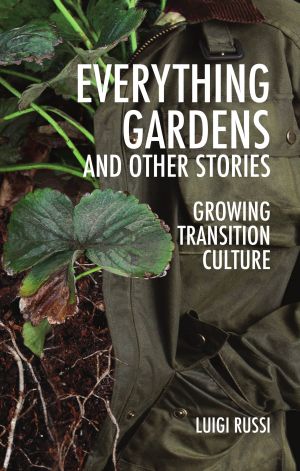
 For Russi (right), academic research on Transition needs to be more immersive, needs to experience the “living moments through which it comes into being. And by moving with it, letting ourselves be moved as well”. For some academics, the move from the 12 Steps in The Transition Handbook (2008) to the Ingredients presented in The Transition Companion (2011) to the
For Russi (right), academic research on Transition needs to be more immersive, needs to experience the “living moments through which it comes into being. And by moving with it, letting ourselves be moved as well”. For some academics, the move from the 12 Steps in The Transition Handbook (2008) to the Ingredients presented in The Transition Companion (2011) to the 
